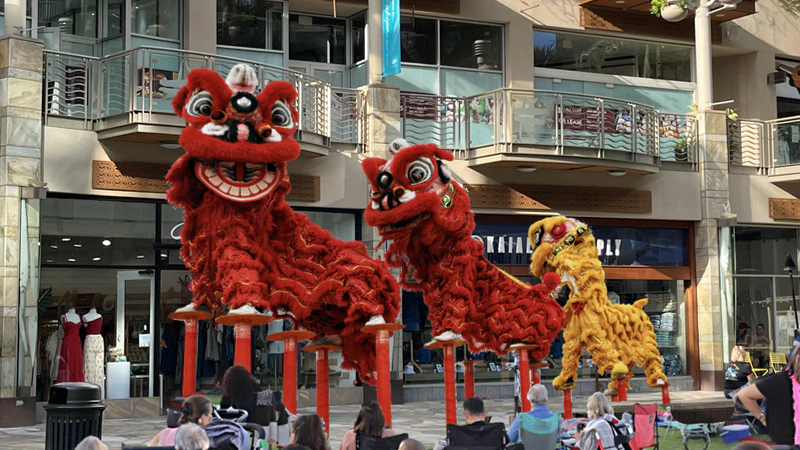Earlier this month, the University of Hawai‘i John A. Burns School of Medicine Department of Native Hawaiian Health and nonprofit Hawai’i Land Trust partnered to launch the Mohala Liko Lehua Program. The program, which started on Sept. 2, aims to provide behavioral health fellows training in trauma-informed, ʻāina- and culture-based care, to better support local communities.
“It’s the first time ever that we’ve had trainees work in ʻāina-based settings with youth. While, there are a few ʻāina-based substance abuse treatment programs, this is the first one where we’re able to target youth to try to build resilience and coping skills, pride in culture, and just boosting kids’ self-esteem,” Program Director Dr. Robin Miyamoto told Aloha State Daily.
Miyamoto added that the one-year fellowship is currently for postgraduate phycologists and social workers who are “typically very clinically based.”
The fellows will be trained by licensed psychologists and social workers from JABSOM and work with HILT to deliver ʻāina-based behavioral health services to at least 4,000 youth on O‘ahu, Maui, Kaua‘i and Hawai‘i Island.
“The nice part about [the] program is that trainees are going to get a balance of working in a clinical setting and experiencing individual therapy in ʻāina-based settings with the keiki,” she said.
In a follow-up email, Miyamoto told ASD the meaning behind the program’s name. “Mohala Liko Lehua literally translates as ‘blossoming flower buds of the ʻōhiʻa tree.’ Figuratively, and for the intent of our program, we translate it as ‘blossoming new experts’.”
“Mohala Liko Lehua was a name given to the program by Keawe Kaholokula. He’s the chair of the Department of Native Hawaiian Health, which is the department the clinical supervisors are coming out of JABSOM,” she said. “It’s this idea that lehua is this bud. As it blossoms, those are our trainees — little buds starting out in their careers. We want to see them blossom into not just great clinical providers, but we want them to become supervisors and mentors within the community for the next generation.”
Miyamoto said that “her heart is really focused on training.”
“I’m grateful for this opportunity and in thinking about training the next generation: You can only carry the water for so long by yourself. I’m really excited about being able to grow the number of folks that do the sort of work that we do and work with the communities that we work with.”
JABSOM and HILT secured a four-year grant fromthe Health Resources and Services Administration that funds part of Mohala Liko Lehua, aiming to train at least 24 fellows over that time period. Additional support has come from Maui United Way, the University of Hawaiʻi, the Office of Hawaiian Affairs, among others. Those interested in contributing to the program may contact angie@HILT.org.
“Getting the notice of award and being able to start this work is really heartening. It gives me hope that we can continue to move forward with the things that are important to our community, regardless of what’s happening at the national level,” Miyamoto said. “I’m also grateful for an introduction just through happenstance to meet ‘Olu Campbell and meet the rest of the HILT team. … It was kind of this perfect alignment.”
Campbell, president and CEO of HILT, told ASD that the program was “inspired by one of the current fellows to a certain extent.”
“It just so happened that the timing worked out where that person who helped to inspire some of the thought behind it was graduating at the same time, and we ended up being able to get it to happen. That was a nice coincidence.”
When asked what makes this program and partnership unique, Campbell noted, “The intersection between ʻāina work and health care is at its infancy. There’s been a handful of organizations trying to advance impact in that intersection. … This partnership is great, I think, in the sense that it’s trying to push innovation at that boundary, trying to explore what are the opportunities to very intentionally bridge work that is supporting healthy ʻāina, or healthy place, while simultaneously trying to better support the health of people involved, specifically in this case through behavioral health support."
The mission of HILT, he said, is “to protect, to steward, to cultivate reciprocal relationships between people in our place that sustain Hawai’i but also contribute to solutions to major systemic issues that our community is facing. We believe that through better connection — interdependence between our people and our place — we can really help to solve our community’s most pressing challenges.”
According to the organization, HILT supports the health, productivity and resilience of Hawai‘i’s biocultural ecosystems, food systems, and kama‘āina and local communities through its eight community preserves, 54 conservation easements, as well as ‘āina transactions, stewardship and community programs.
Campbell’s goal for the Mohala Liko Lehua program is to as “seamlessly as possible, integrate [it] into that broad sweep of existing programs that happen across our sites.”
Part of the program’s success will rely on both JABSOM and HILT teams’ expertise, he added. “I would describe it more of a co-development program. I think our team brings a certain level of expertise and familiarity with doing certain things. JABSOM staff, as well as the fellows, bring their unique expertise. It’s like we’re bringing all the cooks into the kitchen and trying to mix this stew that’s going to be the best stew that we can serve.”
Campbell clarified that fundraising for the program’s first year is “basically covered now,” but they still need to raise “the additional funding that’s needed to fill out the rest of the program budget for the next three years.”
He told ASD that a successful four years could look like providing "that fellowship opportunity for mental health professionals to meet the needs of the community … to provide better quality, higher impact support to the people who come through our programs.”
Long-term, he said a byproduct of success would be collecting data and research from the program. “Our hypothesis is that ‘āina-based health care can produce meaningful health outcomes and maybe even better outcomes than what can be experienced through a clinical setting.”
“Every dollar that comes into this program isn’t just supporting health; it’s supporting education; it’s supporting better ‘āina stewardship; it’s supporting the growth of our local food systems; it’s supporting living wages for people who are working in green careers, a more sustainable local economy,” Campbell said. “There are so many layers of impact that this type of programming enables.”
When asked why the launch of this program is significant to him, Campbell replied, “I’m an impact-driven person. I’m here at this organization because I want to do good for our community. I want to do good for our place and to the extent that we can find creative ways like this to do more of that work in efficient ways. I’m excited about that opportunity. And it’s a new thing. I enjoy the challenge of trying something new, trying to figure something new out in good partnership with JABSOM, and even other organizations who are in the health space that maybe wouldn’t have otherwise thought to be a partner with us.”
For the latest news of Hawai‘i, sign up here for our free Daily Edition newsletter.
Kelsey Kukaua Medeiros can be reached at kelsey@alohastatedaily.com.





